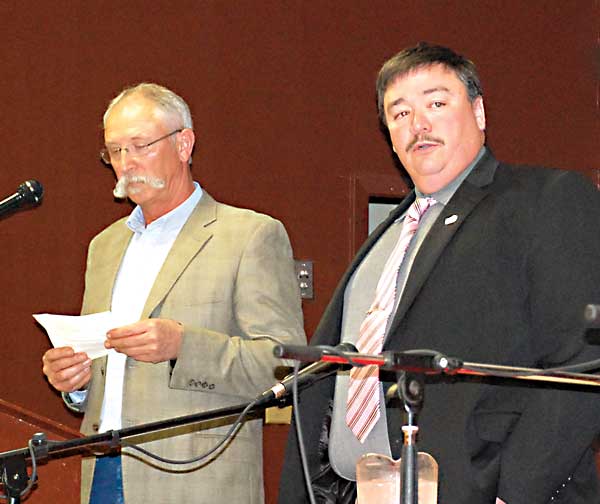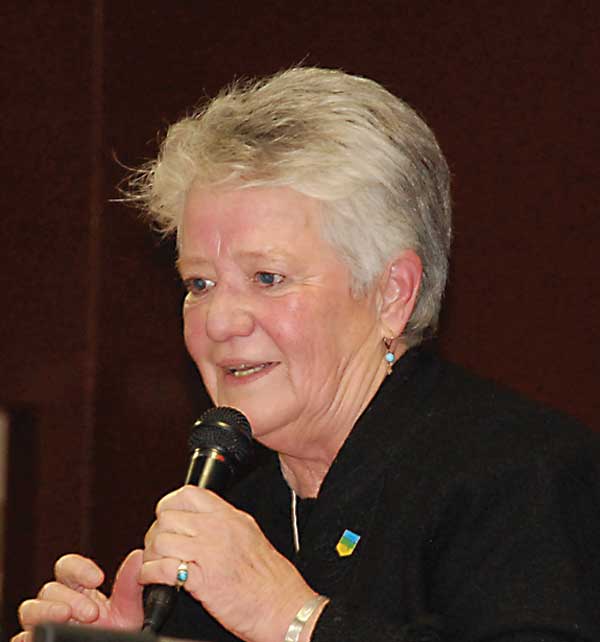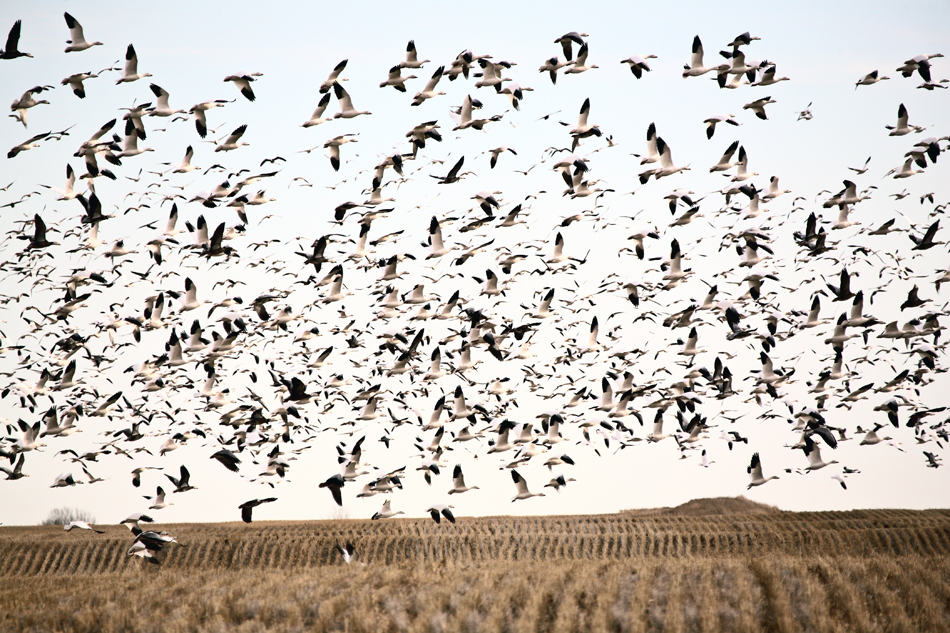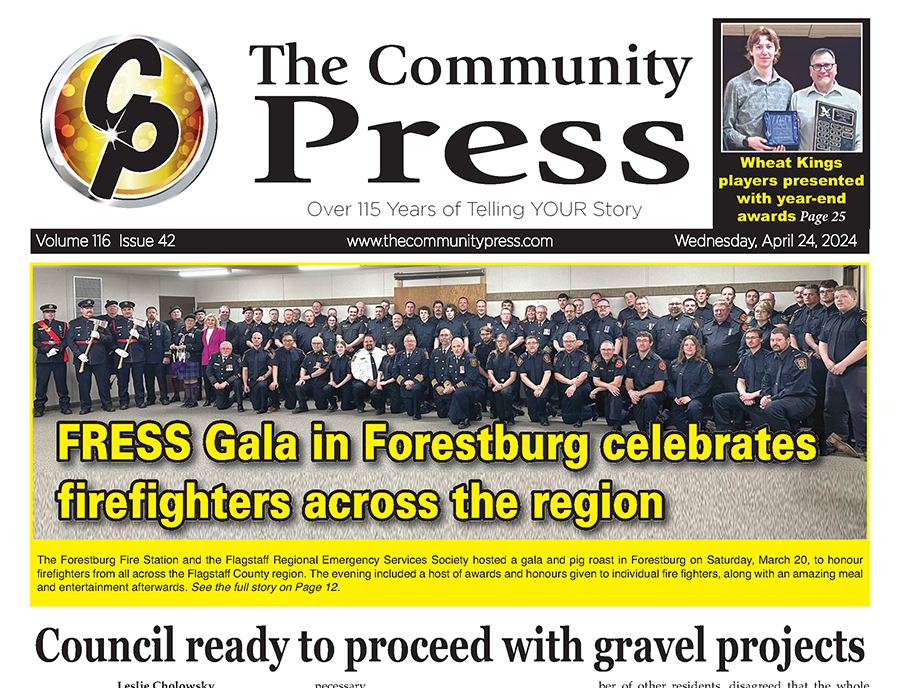Griffiths stands out in Daysland candidate forum *Web Exclusive!*
Around 150 people showed up in Daysland Tuesday, Apr. 17 to attend a candidate forum for the Battle River-Wainwright riding.

Two of the five candidates for our district, NDP Alberta candidate Terry Zawalski, and Alberta Liberal Party candidate Amber Greenleese, not only did not show up, they didn‘t even respond to the invitation, according to one of the organizers. The three remaining candidates at the forum were PC Alberta incumbent Doug Griffiths, Wildrose Party candidate Dave Nelson, and Alberta Party candidate Midge Lambert.
The forum format was open question, and each candidate was given five minutes to give their opening and closing statements, and limited to one-minute responses to all questions.
Questions could be written down and delivered to the moderator, Daysland Ag. Society President Dennis Sereda, or asked over an open mic.

Dave Nelson, Wildrose candidate, gave a short biography; he‘s been active in 4-H, the Ag. Society in Metiskow, the Discing club, he serves as a trustee on the Buffalo Trail school board, and is active in the curling club, and Hughenden Lions club.
Nelson got involved in the Wildrose Party before Danielle Smith became leader; he said he initially attended the leadership convention to support someone else, but was so impressed with Smith he changed his mind.
Nelson said, “I became a candidate last November, and we really brought up the profile in this area.”
“The big reason I got involved was that we stand for free enterprise, less government, increased personal freedom and democracy.”
Nelson said he was in Edmonton the previous day to sign the Wildrose pledge.
“I‘m very proud of the commitments Wildrose has, to rural Alberta, power consumers, to municipalities, and to our parents and education.”
“The last thing I‘ll say, the Wildrose is committed very strongly to one thing, ‘no tax hikes, period‘,” Nelson closed, flashing a sign to that effect.

Midge Lambert, the new Alberta Party candidate for Battle River-Wainwright, thanked Dennis and the organizers, and said, “It‘s just awesome to see so many people turn out.”
Lambert said she‘s lived in Alberta since the age of two; one of her grandfathers homesteaded near Stettler, and her maternal grandfather founded 4-H in Alberta.
“Many of you don‘t know much about the Alberta Party,” she said, “I‘d like to tell you a little something. “Albertans haven‘t had much of a choice in the last two elections.
“Just this last election Alberta had the lowest turnout of any general election in any jurisdiction anywhere in Canada, ever,” Lambert said the old parties didn‘t seem to resonate with Albertans.
“The Alberta Party was formed from people who were tired of partisan bickering and the negative tone of political debate. The party engaged young people, and people who came together, because we believe that good ideas are more important than idealogy.”
Lambert explained the process the party calls ‘The Big Listen‘ where Albertans were asked three questions:
“What are you daily challenges; what are your hopes for the future; and what do you love about Alberta?
“Those discussions became the basis of our policies.” Lambert said the Alberta Party will collaborate with any person, and above all, “We will listen and learn from you because we know we don‘t have all the answers and some of our policies aren‘t as developed as others.”
Lambert closed with, “I would rather be down there listening with you about all this, but I‘m happy to answer your questions.”
Doug Griffiths, PC incumbent, opened his remarks by saying, “This is really exciting; I‘m so glad to see so many people here tonight.
“It was almost impossible to get anyone in this constituency to talk about the election last time,” he added.
“I‘ve been your MLA for 10 years, before that I was a teacher and a rancher.
“Back then, I was concerned about future of our community; I was worried about what our communities would look like in 10 years.
“I shot my mouth off one too many times and the next thing I knew, I was MLA.
Griffiths said he has travelled all over Alberta, “Of 422 municipalities, I‘ve seen 328, and the challenges we have in Daysland, Forestburg, and Chauvin are not just our challenges, but the same challenges every community in Alberta has.
“I never, ever, quit working on better communities. On my own time and on my own dime, I wrote the book ‘13 Ways to Kill your Community.’”
Of his work in the government, Griffiths said, “We are not done yet. Someday we will be successful, and I can go back to riding my horse and teaching.
“It‘s easy to criticize, and that‘s the opposition party‘s job, but not one single person or party has ever been perfect.
“I hope everyone realizes, and I‘ve come to find out that many don‘t, that in the last 16 years, 1,000,000 people have moved to this province.
“That‘s a population the size of Calgary, that didn‘t come with their roads, or schools, or hospitals, all things provided by the government.
“But they also didn‘t come with their water, or sewer, or their swimming pools or their halls, which are provided by the municipal government.”
Griffiths closed by saying, “The PC‘s have been in power for 40 years, we are the most successful jurisdiction in North America, and Alberta has the largest amount of investment in North America.
“We have no debt, the lowest taxes, and the third-best education system in the world.
“We have outstanding healthcare; I know it‘s not perfect but there isn‘t a jurisdiction in the world that doesn‘t have issues with healthcare.
“We have been told to be prepared for one million more people moving in next 10 years. And they will come here with just a suitcase; without infrastructure, because Alberta is the bright light in all of North America. It is security and stability.
“It‘s important that we build an Alberta that our kids can be proud of.
“We are here because of the leadership, the dedication, and the vision that came 40 years ago, we have to carry that journey on, and I hope you‘ll help me do that.”
Two main issues stood out as the candidates, alone or as a group, were called to answer a variety of questions, those being rural education funding and the proposed transmission lines, along with contentious Bills 18, 24, 36, and 50.
Nelson stuck very closely to party literature for most of his responses, rarely straying from Wildrose Party policies, even when asked for specific strategies or ideas.
When asked about equalizing rural education funding, one comment he made was: “The problem with a small school, there‘s just so many dollars it takes to make it run and if you don‘t have it, you can‘t keep the school open.”
When asked by a teacher about how he would put funding directly into rural classrooms, Nelson said, “The whole problem with rural Alberta, it has massive red tape and bureaucracy that‘s really hurting our small businesses, they don‘t thrive in Alberta,” going on to also cite the need to clean up the health boards, getting local health boards started up again, gaining local autonomy, to bring people back to rural Alberta; really sidestepping the question about rural classroom funding altogether.
When asked, “What are your plans, not your party‘s plans, to help small schools in Battle River-Wainwright?”
Nelson replied, “Education has been my passion for 40 years,” then reiterated the need to put autonomy into local school boards, which he agreed later than they had already to some degree when talking about putting a daycare into schools, and added in response to the question about helping small schools in Battle River-Wainwright: “A lot of good things in Bill 18 and Bill 2, with a few little amendments so it would have made the people happy with getting the [teachers] not co-parenting our children and allowing the people to teach religious rights, we could have got that bill but for some reason we didn‘t pass Bill 18… then this spring Bill 2 doesn‘t pass.”
When asked about the transmission lines and Land Use bills, Nelson said, “There‘s a lot of problems with Bill 50, $16.7 Billion works out to $17,000 for every household in Alberta of a family of four.”
“A few people don‘t support the Bill 50 line, I‘d like to read a few examples and comments,” he said, “The City of Lethbridge says it makes no sense to build power lines today that won‘t be used for 40 years; the Industrial Power Users Assoc., say the same thing.
Nelson added, “This will triple the power rates in Alberta,” but did not cite his source on that, and added, “also there are two others, the Alberta Food Processors Association, who say food processing will cost 25 per cent more, and last night standing MLA Jack Hayden said he will repeal Bill 50 in front of 200 people in Drumheller.”
To the question of whether he would repeal Bills 19, 24, 36, and 50, Nelson responded with just “Yes.”
When discussion arose about a question on selling power, Nelson showed a few pieces of paper that he said were 2006 plans showing power lines from Alberta to California and Idaho, saying, “I‘m not sure if we‘re selling to the United States or what we‘re doing. I guess if we want to sell power to the United States then the company should be building the power line.”
“If we need the lines then we need the lines,” Nelson said, “but if it‘s about selling power to the States I don‘t see why Alberta taxpayers should build a power line; give them an extra nine percent to build the power line, so let‘s just get to the bottom of it.”
Nelson did not clarify how the Wildrose Party intends to clarify the need, or lack thereof, of new transmission lines in Alberta.
Lambert was at somewhat of a disadvantage, as her party is so new all the policy is not fully formed.
Lambert answered over half of the questions put to her with questions of her own, or, as when asked about helping small agriculture, said, “It‘s about getting the people together, and as a government, their role is to get the people together with the experts, make sure they‘ve got the resources to have these discussions and these meetings and come up with those kind of decisions, not make the decisions, but facilitate the people that are on the ground to make them.”
Lambert referred to more discussions when she said, “The Alberta Party would create a more balanced relationship between the provincial government and the municipal government, and then have them start discussions for ideas on the best way for municipal funding.”
Griffiths faced the most solitary questions, as incumbent.
When answering questions on the issues of education funding for rural schools, Griffiths outlined a plan he had developed while running in the leadership race earlier in the year, where he said, “I worked out that about $70 million, out of a $6.5 billion education budget, would ensure each of our small communities would have well-supported schools and a program to make sure we attract young people to rural communities throughout Alberta.”
When answering the question about putting more funds directly into rural classrooms, Griffiths added, “If a patient goes to the city, funding does too, it will drive less support for rural healthcare and schooling to use the ‘funding following the patient and the student model,'” as suggested by Nelson earlier as part of the Wildrose education strategy.
“$70 million would go a long ways towards building community schools, instead of funding the number of students; first you work out programming, and then staffing to deliver that program, and you make sure you don‘t have triple grading.”
“That $70 million would allow proper funding in small communities, allowing community-based education programs, instead of the money following the student, which every year brings us to the brink of closing another rural school. It‘s time we turned that around. “Education is not just about education, it‘s about building communities too.”
When asked if MSI funding would continue, Nelson said, “Once we come into a surplus in this province, we are going to take 20 per cent of the surplus, it’s going to [sic] go back to the municipalities with no strings attached.”
Griffiths pointed out that the Wildrose municipal funding models sending 10 per cent of tax revenues represents a $400 million reduction in funding for municipalities, then corrected Nelson’s comment about municipal funding where he had quoted 20 per cent any budget surplus going back to the municipalities actually being 10 per cent according to Wildrose policies.
Griffiths said the PC’s plan to change the current $900 million MSI funding limit to $1.6 billion for whatever municipalities need to do in their communities. He also said that as Minister of Municipal Affairs, he had substantially cut the MSI application process down to a single sheet, reducing red tape for municipal administrators.
With respect to questions about the transmission lines, Griffiths first clarified some of the information presented by Nelson, saying that $16.4 billion was the total price tag of 40 years worth of projects planning, but that the actual cost for the transmission line project was $3 billion, amortized over a 30 year period.
To put that in perspective, Griffiths said that Alberta‘s road building structure has a $40 billion estimated cost, for plans up to 60 years in the future.
Griffiths said, “It will take 40 years to reach full capacity, just like the ones we built 40 years ago. They are meant and designed for growth. They are amortized over 30 years, that‘s 30 cents per $ billion per bill, that‘s pretty small.”
He added, “Of course there was a needs assessment done, no one builds power lines without doing a needs assessment.”
He added that Alberta is the only jurisdiction in Canada that has two public hearings; one for needs and one for location.
Griffiths was adamantly unapologetic when he was asked if he would repeal all the contentious bills, he said, “No, I‘m sorry.” He then went on to explain the projects that each bill has enabled, like new ring roads around the cities.
“Bills 24 and 36 give more land owner protection as well. Bill 36 is making sure we don‘t pave over good arable land.
“Bill 50 is about critical infrastructure, before the lights go out. Go to Leduc, tour some of the industries there,” he said, “because they tell me if you don‘t build those lines, I‘m going to move, because I can‘t have the lights flickering all the time.”
“I will not repeal them, it would be backwards to do so.”
Regarding the sale or export of power, Griffiths pointed out that these new lines don‘t reach the borders, and added, “But frankly, I think that someday soon we should consider whether or not we export the power.
“They have to supply Alberta first, but then if there is surplus, they can export it, and if we don‘t allow them to, they will build in Saskatchewan or Montana, or somewhere else and not here; we will be buying power from another jurisdiction.
“It‘s the same principle we use with cattle and grain and every other thing that we export; we export the surplus, and that‘s how our economy grows.”
Comments from some present noted how much more polished and well spoken Griffiths was during the evening, working from no notes at all.
It can be said, as well, that Griffiths, of all three candidates, was the one who replied to each question with a pertinent answer.
Griffiths clearly had the better grasp of and was able to discuss in quite a lot of detail a wider variety of issues off the cuff, and once even corrected Nelson on the Wildrose policies quoted in Nelson’s answers.
Griffiths has written the Rural Development Strategy, and the advantage of having run for party leadership has given him the opportunity to define strategies and ideas about changes to education and rural development on his own, without relying completely on party policy for his replies.
The decision that remains for residents of the Battle River-Wainwright riding is who will best represent you in the Legislature?
Who will take on the important issues facing our rural community, including rural education funding?
Leslie Cholowsky
Editor







